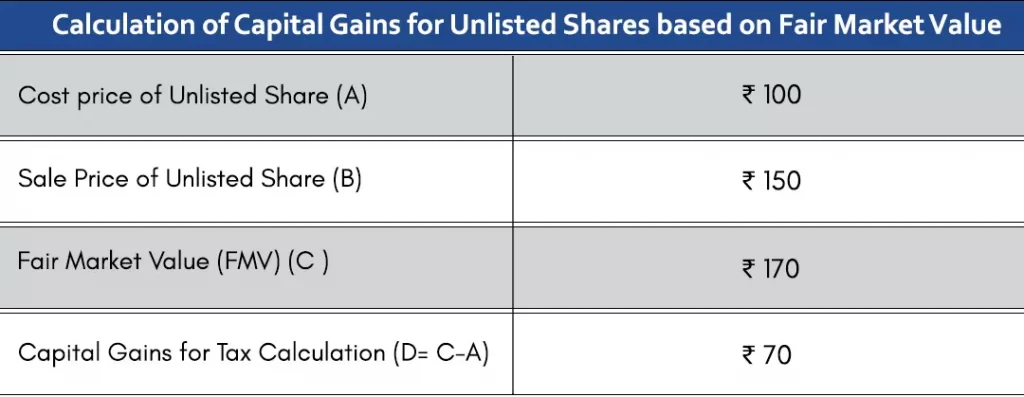
20th January, 2022
With unlisted shares becoming popular among individual investors, it becomes imperative to know how the tax differs from what is levied on listed stocks.
Practically speaking, you own the same thing whether you buy shares from a listed or unlisted market—a piece of the business—but taxation laws are different for gains arising from both of them.
For listed securities, the cost and sale price is readily available so calculation of gains or loss is simple.
But for unlisted shares, a fair market value (FMV) of a security needs to be determined. Either a company appoints a merchant banker to fix an FMV or it can be determined by a formula provided by the income tax department.
In case the selling price is lower than the FMV, the capital gains will be assessed based on the FMV, not your selling price.

Capital Gains on unlisted shares are classified under two brackets: Short Term Capital Gains (STCG) and Long Term Capital Gains (LTCG).
STCG: If you sell your unlisted shares within 24 months of buying, gains or losses will be classified as short term. STCG will be considered part of your income and taxed according to your income slab rates.
In the case of listed shares, STCG is taxed at 15%.
LTCG: If you sell your unlisted shares after holding for 24 months, then your capital gains or losses will be classified as long term. These gains are taxed at a flat rate of 20% with indexation benefits.
In case of listed shares, LTCG is exempt up to Rs 1 lakh. Beyond that, gains are taxed at 10%. Moreover, you need to hold listed shares for just 12 months to qualify as LTCG.
# Indexation Benefits
Indexation benefits incorporate the impact of inflation in your acquisition price.
For example, if you bought 100 shares of Chennai Super Kings at Rs 100 per share in fiscal year 2017-18, the indexed cost of acquisition for tax calculation in fiscal 2021-22 will be Rs 11,654 [10,000*(317/272)] and not Rs 10,000, which was the actual price of acquisition. The indexed cost of acquisition reduces your tax outgo.
To calculate indexed acquisition cost, use this tool provided by the Income Tax department website.
Cost inflation index (CII) to use in this tool can be downloaded from here.

# Capital Gains Tax on Shares Sold After Listing
Assuming you are a retail investor, if you do not sell your unlisted shares before the company gets listed on exchanges, you cannot sell them for a certain amount of time.
For such shares there is a lock-in period of 12 months, which will be reduced to six months from April 2022.
Suppose you held Zomato shares before the company went through initial public offering (IPO) and plan to sell after the lock-in period ends. In that case, gains from the sale will be taxed as per rules governing capital gains on listed shares.
If the stock was held for more than 12 months, there will be 10% tax on total long term capital gains beyond Rs 1 lakh. In case, the shares are sold within 12 months of buying (applicable only after April 2022 when new rules come into force), tax outgo will be 15% of the gains.
# Setting off Losses
There is a chance that you may have to sell unlisted shares at a loss. Tax laws allow setting off losses against other capital gains and future gains, which reduces tax impact.
If these shares are sold at a loss, they cannot be set off against any other sources of income like salary, house property, income from business and other sources.
Short term losses can be set off from any capital gain income whether it is long term or short term. If there is no other capital gain in that year then it can be carried forward up to the next eight years.
In case of long term losses, it can be set off by any other LTCG income. If there is no other long term capital gain in that year then it can also be carried forward up to the next eight years.
# Taxation of Dividend
There is no difference in applicable taxes on dividend income from listed or unlisted companies. Dividends are taxed in the hands of shareholders, according to the tax slab they fall into.
Which ITR forms to use?
If you are a salaried employee, and have gains or losses from selling unlisted shares, you need to file Income Tax Return (ITR) Form 2. If a person has business income and gains or losses on unlisted shares, ITR-3 must be filed.
